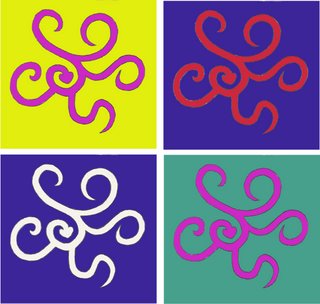
We are inspired or burdened by homegrown myths about U.S. America. (I feel compelled to write “U.S. America” at least once, not “America,” out of deference to friends north and south of the border who remind me that they too are Americans.) As if we did not have enough trouble remaining aware of self-generated myths, U.S. Americans need to be conscious of an overlay of mythical meanings projected on the country by people around the world, and still other visions that U.S. Americans imagine that others have of them -- projecting what we imagine others may be projecting.
We have countless representations about those who come to America and expect to find streets of gold and suppose that the U.S. Americans they meet will be like the characters they have seen on Father Knows Best or some other idealized, unrealistic portrayal of family life in the U.S.A. We glimpse the hopes and disillusionment of these desperate dreamers in films, from Charlie Chaplin’s The Immigrant, and others, through the decades, on to America, America, The Godfather, and Once Upon a Time in America. I still have not read it, but I hear that Franz Kafka’s Amerika is a private imagination projected on that blank place called America. The U.S. even finds its way into the private mythology of William Blake; in his mystical (and politically progressive) realm he sees that
Washington spoke; Friends of America look over the Atlantic sea;
A bended bow is lifted in heaven, & a heavy iron chain
Descends link by link from Albions cliffs across the sea to bind
Brothers & sons of America….
In that verse Blake may have been the first to imagine “Angels in America”:
Fiery the Angels rose, & as they rose deep thunder roll’d
Around their shores: indignant burning with the fires of Orc
And Bostons Angel cried aloud as they flew thro- the dark night.
 With life as it has been in Jerusalem in the last 100 years, it is odd to think how “Jerusalem” had the same unreality for a long time, and for many non-Jews, it was, like “America,” another word for “utopia” (or the “promised land” that every human, not just Jewish people, long for). Blake’s poem, “Jerusalem,” has that vision, and was set to music, and its thrill of hope for a green world to replace the industrial has become a grand, proud hymn that the English like to sing wholeheartedly – and, if it weren’t for the overlay of what Jerusalem has become – it would be the first anthem for the Greens:
With life as it has been in Jerusalem in the last 100 years, it is odd to think how “Jerusalem” had the same unreality for a long time, and for many non-Jews, it was, like “America,” another word for “utopia” (or the “promised land” that every human, not just Jewish people, long for). Blake’s poem, “Jerusalem,” has that vision, and was set to music, and its thrill of hope for a green world to replace the industrial has become a grand, proud hymn that the English like to sing wholeheartedly – and, if it weren’t for the overlay of what Jerusalem has become – it would be the first anthem for the Greens:JERUSALEM by William Blake
And did those feet in ancient time
Walk upon England's mountains green?
And was the holy Lamb of God
On England's pleasant pastures seen?
And did the Countenance Divine
Among these dark Satanic mills?
And was Jerusalem builded here,
Among these dark Satanic Mills?
Bring me my Bow of burning gold:
Bring me my Arrows of desire:
Bring me my Spear: O clouds unfold! Bring me my Chariot of fire.
I will not cease from mental fight,
Nor shall my sword sleep in my hand Till we have built Jerusalem
In England's green & pleasant land
 It would be an enormous project to compile foreign projections onto the U.S. in books, films, even history books. So often, a European fictional character, caught in a web of circumstance, escapes, at the end of a novel, to fabled America – like Mitya in Dostoevsky’s The Brothers Karamazov, whose choice is Siberia or America:
It would be an enormous project to compile foreign projections onto the U.S. in books, films, even history books. So often, a European fictional character, caught in a web of circumstance, escapes, at the end of a novel, to fabled America – like Mitya in Dostoevsky’s The Brothers Karamazov, whose choice is Siberia or America:[Mitya/Dmitri, speaking to his brother Alyosha]: "I shall escape, that was settled apart from you; could Mitya Karamazov do anything but run away? But I shall condemn myself, and I will pray for my sin forever. That's how the Jesuits talk, isn't it? Just as we are doing?"
"Yes." Alyosha smiled gently.
"I love you for always telling the whole truth and never hiding anything," cried Mitya, with a joyful laugh. "So I've caught my Alyosha being Jesuitical. I must kiss you for that. Now listen to the rest; I'll open the other side of my heart to you. This is what I planned and decided. If I run away, even with money and a passport, and even to America, I should be cheered up by the thought that I am not running away for pleasure, not for happiness, but to another exile as bad, perhaps, as Siberia. It is as bad, Alyosha, it is! I hate that America, damn it, already. Even though Grusha will be with me. Just look at her; is she an American? She is Russian, Russian to the marrow of her bones; she will be homesick for the mother country, and I shall see every hour that she is suffering for my sake, that she has taken up that cross for me. And what harm has she done? And how shall I, too, put up with the rabble out there, though they may be better than I, every one of them? I hate that America already! And though they may be wonderful at machinery, every one of them, damn them, they are not of my soul. I love Russia, Alyosha, I love the Russian God, though I am a scoundrel myself. I shall choke there!" he exclaimed, his eyes suddenly flashing. His voice was trembling with tears. "So this is what I've decided, Alyosha, listen," he began again, mastering his emotion. "As soon as I arrive there with Grusha, we will set to work at once on the land, in solitude, somewhere very remote, with wild bears. There must be some remote parts even there. I am told there are still Redskins there, somewhere, on the edge of the horizon. So to the country of the Last of the Mohicans, and there we'll tackle the grammar at once, Grusha and I. Work and grammar – that’s how we'll spend three years. And by that time we shall speak English like any Englishman. And as soon as we've learnt it – good-bye to America! We'll run here to Russia as American citizens. Don't be uneasy – we would not come to this little town. We'd hide somewhere, a long way off, in the north or in the south. I shall be changed by that time, and she will, too, in America. The doctors shall make me some sort of wart on my face – what’s the use of their being so mechanical! or else I'll put out one eye, let my beard grow a yard, and I shall turn grey, fretting for Russia. I dare say they won't recognize us. And if they do, let them send us to Siberia – I don't care. It will show it's our fate. We'll work on the land here, too, somewhere in the wilds, and I'll make up as an American all my life. But we shall die on our own soil. That's my plan, and it shan't be altered. Do you approve?"
"Yes," said Alyosha, not wanting to contradict him. ….

I drifted into these musings because of an essay, “Reflections in the Evening Land,” by celebrated critic Harold Bloom, despondent about the Bush Era. He begins with a quotation from Huey Long, “the Kingfish,” who dominated the state of Louisiana from 1928 until his assassination in 1935: “Of course we will have fascism in America but we will call it democracy.”

Bloom quotes a distinction in Emerson that is echoed by our contemporary philosopher, Richard Rorty, contrasting the future-looking progressive with the reactionary’s aversion to change: “The United States since Emerson has been divided between what he called the ‘party of hope’ and the ‘party of memory’.”
(An aside: Bloom says, “I turn again to Moby-Dick, the national epic of self-destructiveness….Some of my friends and students suggest that Iraq is President Bush’s white whale.”)
Bloom refers to “The Evening Land,” a poem D.H. Lawrence wrote in Baden Baden before he came to live for an extended period in the United States. Lawrence’s verse rambles like Mitya’s speech, troubled with ambivalence about ambiguous and illusive U.S. America. Here are some excerpts:
Oh, America,
The sun sets in you.
Are you the grave of our day?
Shall I come to you, the open tomb of my race?
I would come, if I felt my hour had struck.
I would rather you came to me.
….
You have cajoled the souls of millions of us,
America,
Why won’t you cajole my soul?
I wish you would.
I confess I am afraid of you.
The catastrophe of your exaggerate love,
You who never find yourself in love
But only lose yourself further, decomposing.
You who never recover from out of the orgasm of
loving
Your pristine, isolate integrity, lost aeons ago.
Your singleness within the universe.
You who in loving break down
And break further and further down
Your bounds of isolation,
But who never rise, resurrected, from this grave of
mingling,
In a new proud singleness, America.
Your more-than-European idealism
….
And then your single resurrection
into machine-uprisen perfect man.
Even the winged skeleton of your bleached ideal
Is not so frightening as that clean smooth
Automaton of your uprisen self,
Machine American.
Do you wonder that I am afraid to come
And answer the first machine-cut question from
the lips of your iron men?
Put the first cents into metallic fingers of
your officers
And sit beside the steel-straight arms of
your women,
American?
This may be a withering tree, this Europe,
But here, even a customs-official is still vulnerable.
I am so terrified, America,
Of the iron click of your human contact.
And after this
The winding-sheet of your self-less ideal love.
Boundless love
Like a poison gas.
Does no one realize that love should be intense,
individual,
Not boundless.
This boundless love is like the bad smell
Of something gone wrong in the middle.
All this philanthropy and benevolence on other
people’s behalf
Just a bad smell.
Yet, America,
Your elvishness,
Your New England uncanniness,
Your western brutal faery quality.
My soul is half-cajoled, half-cajoled.
Something in you, which carries me beyond.
Yankee, Yankee,
What we call human.
Carries me where I want to be carried…
Or don’t I?
….
Your horrible skeleton, aureoled ideal,
Your weird bright motor-productive mechanisms….
Nobody knows you.
You don’t know yourself.
And I, who am half in love with you,
What am I in love with?
My own imaginings?
Say it is not so.
Say, through the branches
America, America
Of all your machines,
Say, in the deep sockets of our idealistic skull,
Dark, aboriginal eyes
Stoic, able to wait through ages
Glancing.
Say, in the sound of all your machines
And white words, white-wash American,
Deep pulsing of a strange heart
New throb, like a stirring under the false dawn that
precedes the real.
….
Dark, elvish,
Modern, unissued, uncanny America,
Your nascent demon people
Lurking among the depths of your industrial thicket
Allure me till I am beside myself….
“These States!” as Whitman said,
Whatever he meant.
In this verse, Bloom notes, D.H. Lawrence – half-afraid, half-attracted – was anticipating “his long-delayed sojourn in America which began only in September of that year, when he reached Taos, New Mexico. He had hoped to visit the United States in February 1917, but England [had] denied him a passport.”
We know how the fragmentary nature of the U.S. population (more a picture puzzle than a melting pot) helps us avoid the kind of simplistic polarity that leads to genocide in so many countries (Oh, yes, there was that Civil War), but the result of our looking at ourselves in a cracked mirror is what Lawrence sensed as an “integrity lost aeons ago.” To discover such an integrity, to have the beginning of an identity that could emcompass multiplicity, the U.S. to identify some singular notion that described its own population and landscape, and find a name like Canada, or Mexico, to have some name less mechanical as the Unitred States, some special name for its part of the North American continent? I suppose it would do a disservice to choose for a name some ideal concept like “Decency” or “Compassion” as political hypocrisy would soon tarnish a good word. Some have suggested that we chose some name used by the indigenous people, but, of course, the widespread tribes have many terms in their several languages for the human world as they saw it (although I would happy if the country asked the descendants of our indigenous citizens to choose a name for us). The name some tribes used translates as “the people.” As we are, I think the spirit of the U.S. would be more accurately described, not as “the people,” but as “the strangers.” Anyone got a suggestion for how to finally name The United States of America?

[Illustrations, by JE: Heart of the Storm]
No comments:
Post a Comment